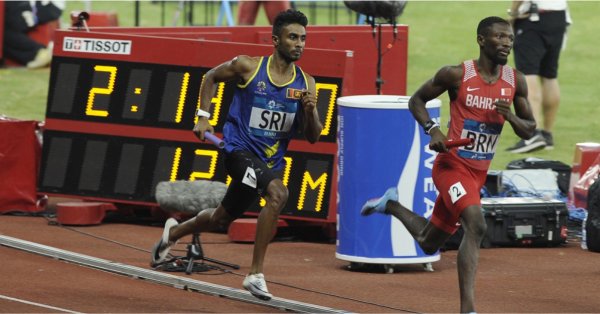
Gathered from across the North and East, around 250 protesters travelled overnight to Colombo yesterday (February 28) to protest military occupied lands in front of the Presidential Secretariat during a Cabinet meeting.
Police officers initially objected to protesters’ attempts to rally outside the Presidential Secretariat, trying to disperse crowds with warnings that the area was a high-security zone – despite ostensibly being a pavement. However, after some negotiations, they agreed to escort six representatives to a meeting with the President’s staff.
In the hours that followed, Minister for National Dialogue Mano Ganesan and MP Douglas Devananda visited the demonstration, each attempting to allay protester concerns and promising to resolve the issues. Meanwhile, children, women, and men waited for hours in the sun, and then the rain, waiting for a response from the Presidential Secretariat.
In a welcome change from the government’s usual silence, representatives emerged carrying a letter in Sinhala and Tamil, addressed to the Defence Ministry and signed by Presidential Secretariat Senior Assistant Secretary Samanthi Ranasinghe. The letter directs the Defence Ministry to inquire into complaints of military occupied private lands and resolve such complaints within the current legal framework.
While protesters composed a broad coalition, many were from areas like Puthukuduyiruppu and Keppapulavu where protests for the return of military occupied land are ongoing. In the case of Keppapulavu, the Air Force today (March 1) released 42 out of 54 acres of land following a Presidential order in response to 30 days of widespread protests.
Though many grievances remain to be resolved, the positive outcomes of protests like the ones at the Presidential Secretariat and in Keppapulavu, combined with international scrutiny from the ongoing UNHRC sessions, indicate that perhaps the government is finally ready to change its tune.
 Police initially tried to disperse protesters, claiming that the area outside the Presidential Secretariat was a high-security zone. They later desisted and escorted six representatives to meet with the Presidential Secretariat.
Police initially tried to disperse protesters, claiming that the area outside the Presidential Secretariat was a high-security zone. They later desisted and escorted six representatives to meet with the Presidential Secretariat.
 Like many of the recent protests that have proliferated the North and East, women, mostly middle-aged or elderly, were front and centre.
Like many of the recent protests that have proliferated the North and East, women, mostly middle-aged or elderly, were front and centre.
 Coordinated by youth organisation AFRIEL, many of the protesters were also young men and women in their late teens and early twenties.
Coordinated by youth organisation AFRIEL, many of the protesters were also young men and women in their late teens and early twenties.
 Chairman of AFRIEL, Ravindra De Silva, had his hands full organising protesters, negotiating with unhappy police officers, and speaking to visiting politicians.
Chairman of AFRIEL, Ravindra De Silva, had his hands full organising protesters, negotiating with unhappy police officers, and speaking to visiting politicians.
 A woman looks on as Minister of National Dialogue, Mano Ganesan, promises to reveal information of military occupied lands at the next Cabinet meeting.
A woman looks on as Minister of National Dialogue, Mano Ganesan, promises to reveal information of military occupied lands at the next Cabinet meeting.
 A protester ducks down behind the banner she is holding up, to check her phone.
A protester ducks down behind the banner she is holding up, to check her phone.
 A bulath (betel leaf) vendor operating around Galle Face tries to make the best of an unexpected early morning crowd.
A bulath (betel leaf) vendor operating around Galle Face tries to make the best of an unexpected early morning crowd.
 A young protester strikes a pose for the camera as his friends laugh in embarrassment.
A young protester strikes a pose for the camera as his friends laugh in embarrassment.
 A boy curiously peers out at the ongoing construction of the Chinese-owned Colombo Port City.
A boy curiously peers out at the ongoing construction of the Chinese-owned Colombo Port City.
 Many visiting protesters seemed drawn to the heavy construction taking place just in front of the Presidential Secretariat, where acres of land are being reclaimed for the Colombo Port City.
Many visiting protesters seemed drawn to the heavy construction taking place just in front of the Presidential Secretariat, where acres of land are being reclaimed for the Colombo Port City.
 Protesters hired five buses and travelled overnight to Colombo from Vavuniya. The trip, followed by hours of protest under the sun and rain, left many exhausted.
Protesters hired five buses and travelled overnight to Colombo from Vavuniya. The trip, followed by hours of protest under the sun and rain, left many exhausted.
Featured image: An elderly protester holds up a board reading “good governance?”







